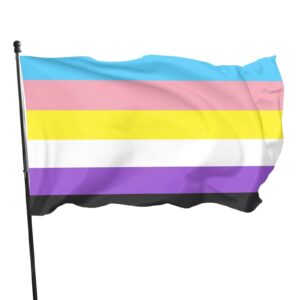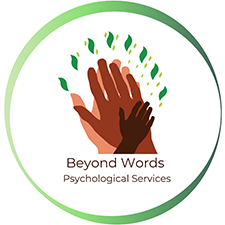“Did You Always Know?” and Other Personal Questions that Shouldn’t Be Asked of Adoptees or Trans/Non-binary Folx

An adoptee reflects on the weird questions people ask trans and non-binary folks—and how familiar they sound.
As an adopted person, I’ve spent my life navigating an oddly specific kind of nosiness. You know, the kind where someone tilts their head, gets a little too interested, and asks something deeply personal like they’re just making small talk. I’ve smiled through it, shut it down, and once or twice just walked away mid-sentence.
So, it caught my attention one day when a friend—who happens to be non-binary—was sharing about the kinds of questions people ask them. And I had this moment of, “Whoa, that’s what I experience!”
Turns out, being adopted and being trans or non-binary comes with some eerily similar social hazards: the surprise identity quiz, the awkward over-familiarity, the assumption that your personal story is public domain. (My heart especially goes out to those who hold both identities, because I can only imagine the unique frustration of navigating these questions on both fronts!)
So, in solidarity and mild exasperation, here’s a rundown of the intrusive questions both adoptees and trans/non-binary folks get hit with—all delivered with that same blend of privilege, curiosity, and complete lack of self-awareness.
- “Do you know your real family?”
It’s an unfortunate classic. Let me just say it loud and clear: “Real” is a complicated word in the adoption world, and regardless of how it’s defined, it is waaayyy too personal of a question to be asking an adopted person who has not invited the topic into conversation.
Now, my trans and non-binary friends get this question a little differently:
“What’s your real name?” Or worse, “What were you born as?”
Same energy. Same entitlement. And the same complete misunderstanding of identity as something you get to define for yourself—not something the world gets to fact-check through a limited and often unknowingly ignorant lens.
- “When did you know?”
As if identity always arrives the opening of an email. For me, being adopted wasn’t a sudden realization. It was something I grew up knowing. But understanding what it meant? That’s an ongoing process. It’s layered, emotional, and not something I can sum up on my restroom break in between sessions with the lady who works down the hall.
And guess what? It’s the same for gender identity. There’s no one timeline, no magical epiphany. Just people doing the explorative, difficult, and beautiful work of figuring themselves out.
- “Do you ever want to go back?”
Back where? The womb? The hospital? The community where I was born? The moment someone else made a decision I had no say in? Once again, it’s a personal and complex adoption-related question that is not necessarily owed an answer.
Similarly, trans and non-binary folks get asked if they regret transitioning, or if they ever think about “going back” to who they were “before.”
Why are people so obsessed with pulling us backwards when understanding and owning our identity and narratives requires us to move forward?
- “Aren’t you worried about your kids?”
This one manages to be insulting, irrelevant, and condescending all at once.
Yes, I’ve thought about how my adoption affects me. No, I don’t think being adopted makes me unfit to parent.
My trans/non-binary friends hear versions of this too: “But what about the children?” As if kids will be scarred forever by knowing someone who is living authentically and showing up as their full self. The kids will be just fine—it’s the grown-up stigmas that are problematic.
- “But you don’t look…”
Please don’t finish that sentence.
“You don’t look adopted” is such a weird thing to say. What exactly are you expecting? A sign? A badge? A “Hi, I’m adopted” t-shirt?
My trans and non-binary friends get this one too. “You don’t look trans” or “You pass so well,” which is often meant as a compliment—but really just reveals how stuck people are on appearances.
Let’s stop trying to assess how someone’s identity looks and focus on who and how they are.
So Why Do People Ask These Things?
Because humans are curious, and people who hold privileged identities have been conditioned to believe they’re entitled to answers. If something challenges mainstream ideas of family, gender, or identity, trying to simplify it feels easier than sitting in the discomfort of shifting our belief systems.
But here’s the thing: Asking deeply personal questions just to satisfy your curiosity is not connection. It’s intrusion masking as interest.
Here’s a Better Way
If someone invites you into their story—whether it’s about being adopted, being trans, being non-binary, or any other part of their identity—treat it like the sacred thing it is.
And if you’re tempted to ask a question, maybe pause and ask yourself:
- Would I want to answer this about myself?
- Do I actually need to know this?
- Am I offering respect and support, or just trying to satisfy my curiosity?
If you’re still not sure what to say, try this: “I really appreciate you trusting me with your story.”
Or even, “I’m here to listen if you ever want to share more.”
In Solidarity
Adopted people and trans/non-binary folks are unique in their social identities, but we share a lot when it comes to navigating identity in a world that struggles to accept us as we are. We get the awkward questions, the stares, the assumptions, and the conversations that take emotional energy we didn’t plan for.
So here’s to saying “no thanks” to unexpected interviews, setting kind-but-firm boundaries (or even not-so-kind boundaries), and building relationships that are based on mutual respect—not mutual curiosity. And if you’ve ever wanted to say, “I’d prefer not to discuss that,” please know that you are allowed to use it anytime.
